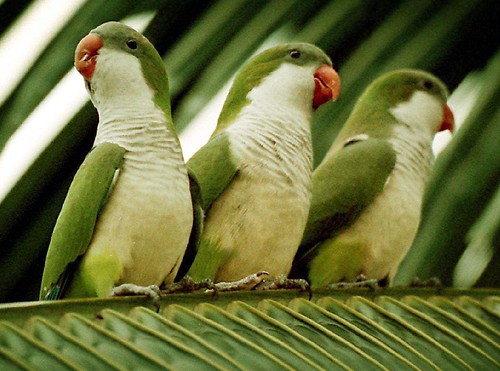About two weeks ago we heard a big commotion on our driveway and saw two parrots. We thought at first they were fighting but it became clear one was dead and it seemed the other was poking it, perhaps trying to wake it up. While my husband went out to take a closer look, three parrots -- one adult and two smaller ones -- flew and swooped over our yard. Later one came back to the dead one, still trying to awake it up. Wildlife Rescue picked up the dead one, but ever since, the parrots are in our yard a lot, squawking and spending a lot of time in the tree right over where the dead one lay. Three parrots perch in a palm tree in an East Three wild parrots in a palm tree. (Emily Kelsey)DEAR JOAN: We have had parrots in the neighborhood for quite a few years. They never spent much time near our house, but we had seen them fly over occasionally.
Three parrots perch in a palm tree in an East Three wild parrots in a palm tree. (Emily Kelsey)DEAR JOAN: We have had parrots in the neighborhood for quite a few years. They never spent much time near our house, but we had seen them fly over occasionally.
I've read parrots will mourn their companions, even starving themselves to death. Do you think this is what they are doing? Marty and Dick Johnson Campbell DEAR MARTY AND DICK: This is a really tricky subject because it requires walking the line between science and the heart. We often assign human emotions and reactions to animals, but researchers are split over how much emotional awareness they have. While a number of creatures -- scrub jays, crows, elephants -- will gather around their dead comrades in what appears to be a heartfelt showing of emotion and sadness, scientists say it may be less about mourning and more about warning. Studies have shown that birds gather around one of their own and make a particular call that draws in more birds. The calls seem to be warnings that someone or something has killed a bird and that the entire flock needs to be aware of the danger. That doesn't completely explain the behavior, however. There are plenty examples of animals appearing to mourn the loss of a mate or a human companion, and parrots, along with crows, are among the smartest of birds. They may not have the brain size that humans have, but they have demonstrated a variety of cognitive and social abilities. Their grief may not be the same as humans, but I believe they feel a loss. Parrots are monogamous and pairs share responsibilities. When one dies, the other will eventually seek another mate out of practicality. As my grandfather used to tell us, "don't pull in single harness all your life," which means life is easier when you have someone to share the burden. With all that said, I don't think the birds are staying around because of continuing grief. The surviving bird may have relocated to your yard because whatever killed the other parrot drove the bird out of its nesting area, or maybe because it has found a new mate. Or they may have just taken a liking to your yard.